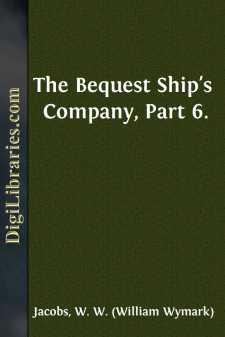Categories
- Antiques & Collectibles 13
- Architecture 36
- Art 48
- Bibles 22
- Biography & Autobiography 813
- Body, Mind & Spirit 142
- Business & Economics 28
- Children's Books 15
- Children's Fiction 12
- Computers 4
- Cooking 94
- Crafts & Hobbies 4
- Drama 346
- Education 46
- Family & Relationships 57
- Fiction 11829
- Games 19
- Gardening 17
- Health & Fitness 34
- History 1377
- House & Home 1
- Humor 147
- Juvenile Fiction 1873
- Juvenile Nonfiction 202
- Language Arts & Disciplines 88
- Law 16
- Literary Collections 686
- Literary Criticism 179
- Mathematics 13
- Medical 41
- Music 40
- Nature 179
- Non-Classifiable 1768
- Performing Arts 7
- Periodicals 1453
- Philosophy 64
- Photography 2
- Poetry 896
- Political Science 203
- Psychology 42
- Reference 154
- Religion 513
- Science 126
- Self-Help 84
- Social Science 81
- Sports & Recreation 34
- Study Aids 3
- Technology & Engineering 59
- Transportation 23
- Travel 463
- True Crime 29
The Bequest Ship's Company, Part 6.
Description:
Excerpt
THE BEQUEST
R. Robert Clarkson sat by his fire, smoking thoughtfully. His lifelong neighbour and successful rival in love had passed away a few days before, and Mr. Clarkson, fresh from the obsequies, sat musing on the fragility of man and the inconvenience that sometimes attended his departure.
His meditations were disturbed by a low knocking on the front door, which opened on to the street. In response to his invitation it opened slowly, and a small middle-aged man of doleful aspect entered softly and closed it behind him.
"Evening, Bob," he said, in stricken accents. "I thought I'd just step round to see how you was bearing up. Fancy pore old Phipps! Why, I'd a'most as soon it had been me. A'most."
Mr. Clarkson nodded.
"Here to-day and gone to-morrow," continued Mr. Smithson, taking a seat. "Well, well! So you'll have her at last-pore thing."
"That was his wish," said Mr. Clarkson, in a dull voice.
"And very generous of him too," said Mr. Smithson. "Everybody is saying so. Certainly he couldn't take her away with him. How long is it since you was both of you courting her?"
"Thirty years come June," replied the other.
"Shows what waiting does, and patience," commented Mr. Smithson. "If you'd been like some chaps and gone abroad, where would you have been now? Where would have been the reward of your faithful heart?"
Mr. Clarkson, whose pipe had gone out, took a coal from the fire and lit it again.
"I can't understand him dying at his age," he said, darkly. "He ought to have lived to ninety if he'd been taken care of."
"Well, he's gone, pore chap," said his friend. "What a blessing it must ha' been to him in his last moments to think that he had made provision for his wife."
"Provision!" exclaimed Mr. Clarkson. "Why he's left her nothing but the furniture and fifty pounds insurance money—nothing in the world."
Mr. Smithson fidgeted. "I mean you," he said, staring.
"Oh!" said the other. "Oh, yes—yes, of course."
"And he doesn't want you to eat your heart out in waiting," said Mr. Smithson. "'Never mind about me,' he said to her; 'you go and make Bob happy.' Wonderful pretty girl she used to be, didn't she?" Mr. Clarkson assented.
"And I've no doubt she looks the same to you as ever she did," pursued the sentimental Mr. Smithson. "That's the extraordinary part of it."
Mr. Clarkson turned and eyed him; removed the pipe from his mouth, and, after hesitating a moment, replaced it with a jerk.
"She says she'd rather be faithful to his memory," continued the persevering Mr. Smithson, "but his wishes are her law. She said so to my missis only yesterday."
"Still, she ought to be considered," said Mr. Clarkson, shaking his head. "I think that somebody ought to put it to her. She has got her feelings, poor thing, and, if she would rather not marry again, she oughtn't to be compelled to."
"Just what my missis did say to her," said the other; "but she didn't pay much attention. She said it was Henry's wish and she didn't care what happened to her now he's gone....












